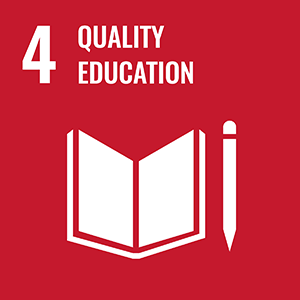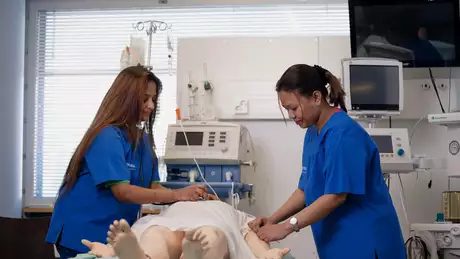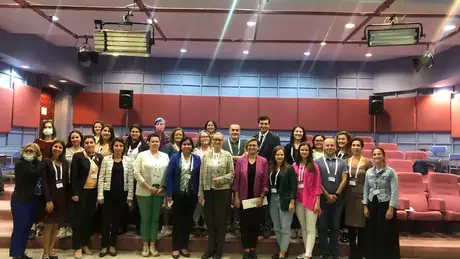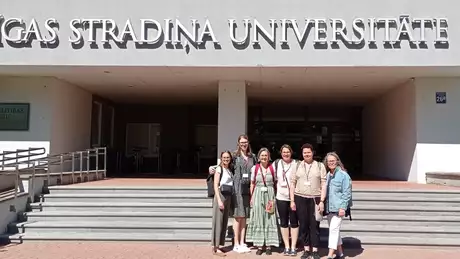DITEPRACT: Digital and hybrid teaching and learning

There is a need to develop high quality innovative hybrid and digital teaching strategies to support learning of practical skills in higher education and to support teacher competence in practically oriented distance teaching and learning.
Ditepract in a nutshell
The learning, teaching and training event at Baskent University October 2022 gives a glimpse of the project in a nutshell.
Remote video URL
You have not yet given permission to place the required cookies. Accept the required cookies to view this content.

The Best Practice Guide publication
When communities worldwide were closed in the spring of 2020 as the COVID-19 disease pandemic hit the world, the consequences for higher education in Europe were extensive. In a flash, higher education activities were moved online without enough time for neither preparation nor planning. Both students and the universities' staff had to adapt to major changes in daily life. Follow-ups and evaluations showed that the universities coped with the change surprisingly well, but also that the challenges in teaching and learning were many, both for students and staff – this shows the newly published Best Practice Guide on the topic: Digital and blended teaching and learning of practical skills in social and health care .
Sustainable development goals

Background
Experiences in the area of education in social and health care during the corona crisis showed that distance learning concerning practically oriented teaching and learning among students in areas where practical skills and hands-on competencies are crucial, were especially challenging and new solutions are needed.
The current pandemic context, with the known difficulties and constraints generated in maintaining the classic models of learning in European higher education, has reinforced the need to integrate virtual learning environments in its plans. Limiting access to the campus learning environments, traditional and standard simulation, used in basic or continuous professional practical skills training, as a rule, implies rethinking the learning scenarios, readopting them to non-classroom or hybrid training or developing new scenarios suitable for the digital tools existing or in development.
Therefore, it is crucial to produce and develop practical competence learning scenarios (pedagogical-didactic materials), suitable for virtual learning environments (hybrid learning). With this we hope to increase the digital skills of European teachers, students and health professionals and contribute to the innovation of pedagogical concepts and models to be used in this virtual learning environments. We intend that European higher education institutions, integrate these scenarios in the training of Health Sciences students and guide the teaching practice in digital support using the developed scenarios. The achievement of this objective will be possible with the development of a digital tool that aggregates and makes available the various scenarios.
This project is Co-funded by the European Union.

Project updates
22.06.2023: Presentation of scenario at Nordyrk Conference
The NordYrk Conference 2023 took place at Western Norway University of Applied Sciences (HVL), Campus Kronstad, Bergen, Norway, 7–9 June. The conference theme was “The role of ‘Bildung’ in vocational education and training and professional higher education”. We took part in the conference with a poster presentation on the scenario developed at Arcada.
When the opportunity to take part in the conference came up, we were not entirely convinced that there were any elements from the concept of “bildung” within our scenario. When we took a closer look at the content and the design of the scenario, we were able to discern some central elements that nurture and develop students and enable them to make their own spaces of learning and belonging. The poster presents the elements that can be covered by certain elements of the concept of ‘Bildung’- such as knowing, thinking and communicating.
Learning practical skills is part of the competence students need and should be able to practice during their education in social and health care. In this context, it becomes central to encourage students to first obtain the knowledge needed for the practical skills and then to critically examine the knowledge together with others by examine the knowledgebase. By thinking together, again critically, they will be able to choose what knowledge to use when acting. The result of the thought process needs to be consolidated in the body through doing.
Doing is about both concretely using one's body to act out what the students in collaboration have thought about - to non-verbally communicate their learning - but also to verbally and in writing communicate what they have learnt. In relationships the students have the possibility to feel their knowledge in their body. They are also given the freedom to learn elements they value and have reason to value. When this takes place together with others and in relation to others ‘bildung’ can be achieved.
To train practicing skills that rest on a solid base on knowledge, that students have critically summarised and reviewed together, acts as a catalyst for the individual student's experience of empowerment and ‘bildung’.
14.03.2023: Publication of the Best Practice Guide
Read the project's newly published publication Digital and blended teaching and learning of practical skills in social and health care (DITEPRACT)
01.02.2023: Welcome to join the seminar/webinar 9 Feb 2023 at 14:00
Transforming Health Care Education: from Classroom to Digital Environment
Programme and more information is found here.
9.1.2023: New publication published
"Exploring the activities and outcomes of digital teaching and learning of practical skills in higher education for the social and health care professions: a scoping review" was published 3 January 2023.
Read the publication here .
15.12.2022: Welcome to join the webinar 19 Jan 2023 at 10:00
Transforming Health Care Education: from Classroom to Digital Environment
Programme and more information is found here.
10.10.2022: The second LTT meeting of the Erasmus+ project
The second LTT meeting of the Erasmus+ project, titled "Digital and Hybrid Teaching and Learning of Practical Skills in Higher Education: DITEPRACT" was hosted by Ba?kent University on 11-12-13 October 2022. The aim of the project, which started on March 01, 2021 and will be completed on February 28, 2023, is to increase the technical knowledge and pedagogical competencies of academicians in order to support students in gaining practical learning outcomes in digital environments. The mission of our project team, consisting of Prof. Dr. Sultan Kav (Faculty of Health Sciences), Assoc. Prof. Dr. Cigdem Baskici (Faculty of Health Sciences), Assist. Prof. Dr. Halil Ersoy (Faculty of Education) and Assist. Prof. Dr. Aydan Ozdemir (Health Services Vocational School), is to reveal the knowledge and experiences of the project partners to form the basis for the development of new scenarios and practical learning strategies on digital platforms, and to disseminate the best practices among the project partners.
Assoc. Prof. Dr. Filiz Kalelioglu, Prof. Dr. Nevzat Ozel, and Assist. Prof. Dr. Halil Ersoy were attended as keynote speakers to conferences held during meeting. Current issues such as the emerging problems of online and blended learning for teaching practical skills, the challenges of online assessment during the Covid-19 Pandemic, and the ethical and social aspects of online education and training were discussed in the conferences. While the project researchers from Arcada University at Finland, University of Coimbra at Portugal, and Riga Stradins University at Latvia attended the meeting physically, others from Mälardalen University at Sweden and the Health Sciences University at Lithuania participated online. In addition, workshops were held at the “Thermopolium Gastronomy Academy” and “Ceramics Studio” to promote our university and culture.
Project objectives and target group
The primary target group for DITEPRACT is teachers and supervisors in higher education from six universities. Around 200 teachers from partner universities will take part in workshops and competence development activities. Several student groups from each university will be actively involved in the pilot studies.
The objectives for DITEPRACT are to:
- explore and map experiences, current activities and practices of digital online technology in subject-specific practical teaching, training and learning in HE in the field of social and health care
- develop in collaboration new concepts and models for digital pedagogical competencies, innovative online resources and tools for teachers by sharing of resources, expertise and best practices
- develop and implement guidelines and best practices of innovative hybrid and online teaching, training and learning of practical skills to support teachers´ digital pedagogical competencies and students´ learning.
Content of this website
The European Commission is not responsible for the content of this website.
Project team
The project consortium has 6 members from six countries (Latvia, Lithuania, Portugal, Turkey, Sweden and Finland). Arcada, Helsinki, Finland is the project coordinator.
The project team members are:
Director Camilla Wikström-Grotell, Arcada, Finland
Heikki Paakkonen, Arcada, Finland
Research director, PhD Jukka Surakka, Arcada, Finland
Senior researcher, PhD, Docent Jyrki Kettunen, Arcada, Finland
Sultan Kav, Baskent University, Turkey
Aydan Aytar, Baskent University, Turkey
Cigdem Baskici, Baskent University, Turkey
Adjunt Professor, PhD Antonio Fernandes, Nursing School of Coimbra , Portugal
Adjunt Professor, PhD Veronica Coutinho, Nursing School of Coimbra , Portugal
Adjunt Professor, PhD, Manuel Chaves, Nursing School of Coimbra , Portugal
PhD Junior Researcher Daniela Cardoso, Health Sciences Research Unit: Nursing, School of Coimbra,
PhD Student, Adjunt Professor Hugo Neves, Nursing School of Coimbra,
Aurelija Blazeviciene, Lithuanian University of Health Sciences, Lithuania
Zivile Kepezinskiene, Lithuanian University of Health Sciences, Lithuania
Professor, PhD Anne Söderlund, Mälardalen University, Sweden
Senior researcher, PhD Maria Elven, Mälardalen University, Sweden
Evita Grigorovica, Riga Stradins University, Latvia
Teaching and Learning Project Mana, ger, Raimonds Strods, Riga Stradins University, Latvia
Manager of Study InnovationsInguna Blese, Riga Stradins University, Latvia
Director of the Centre for Educational Growth, Dr. paed., Associate professor Nora Jansone-Ratinika, Riga Stradins University, Latvia
Simulation-based education project manager, Evita Grigorovica, Riga Stradins University, Latvia
Deputy Director of Medical Education Technology Centre, Andreta Slavinska, Riga Stradins University, Latvia



